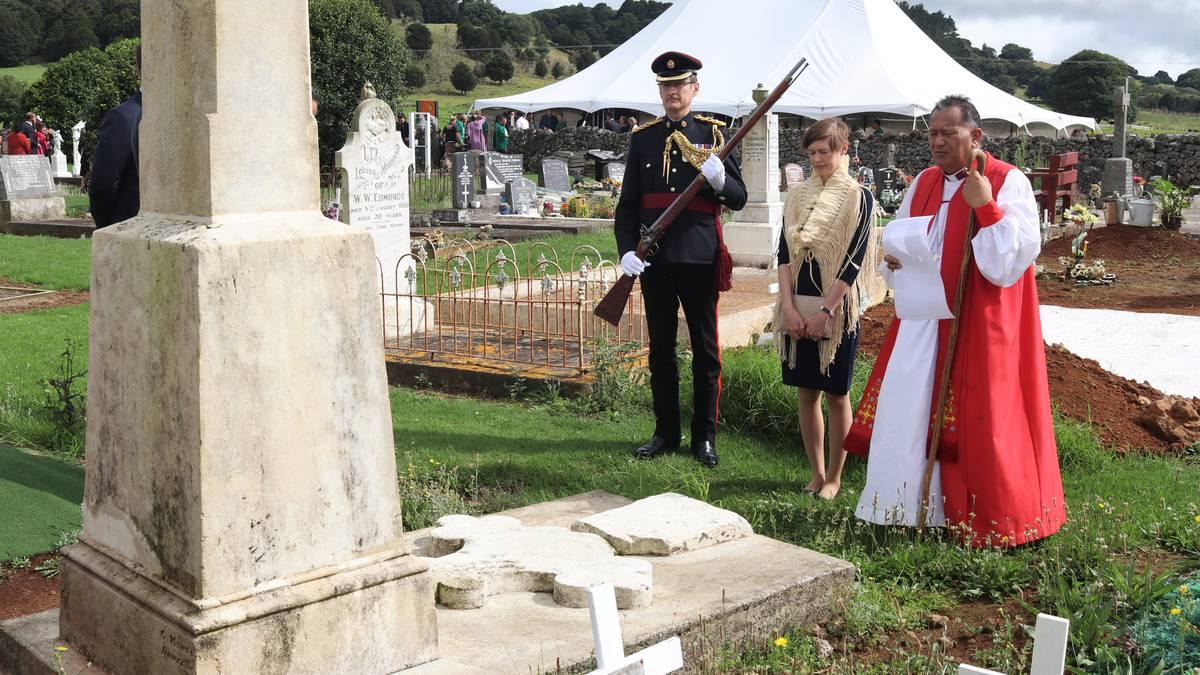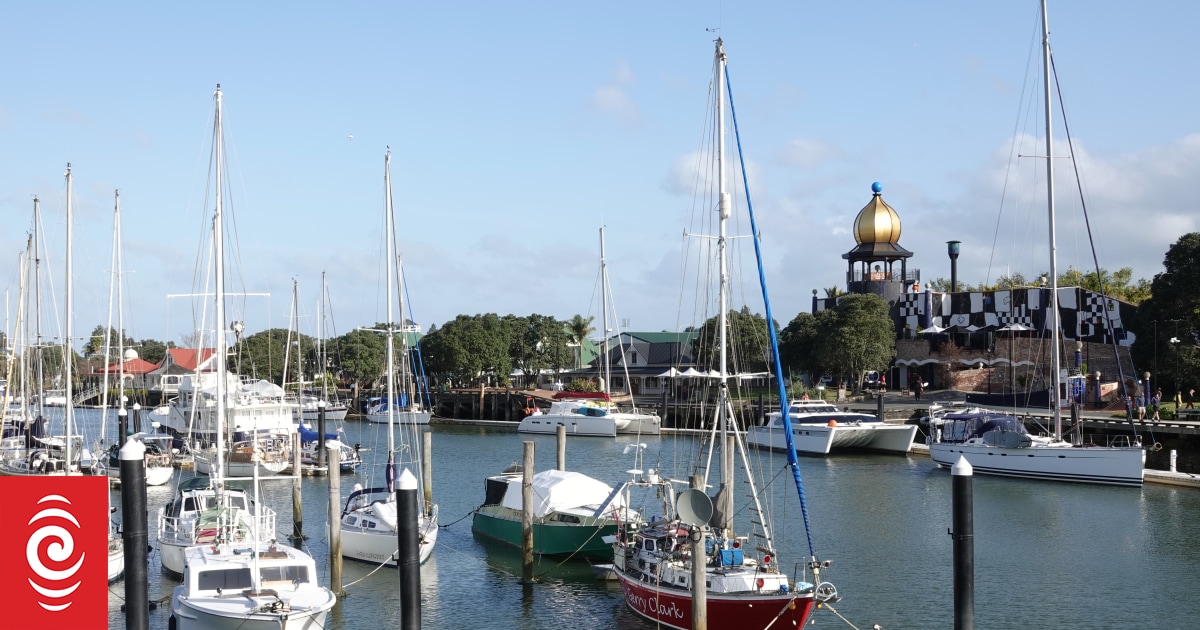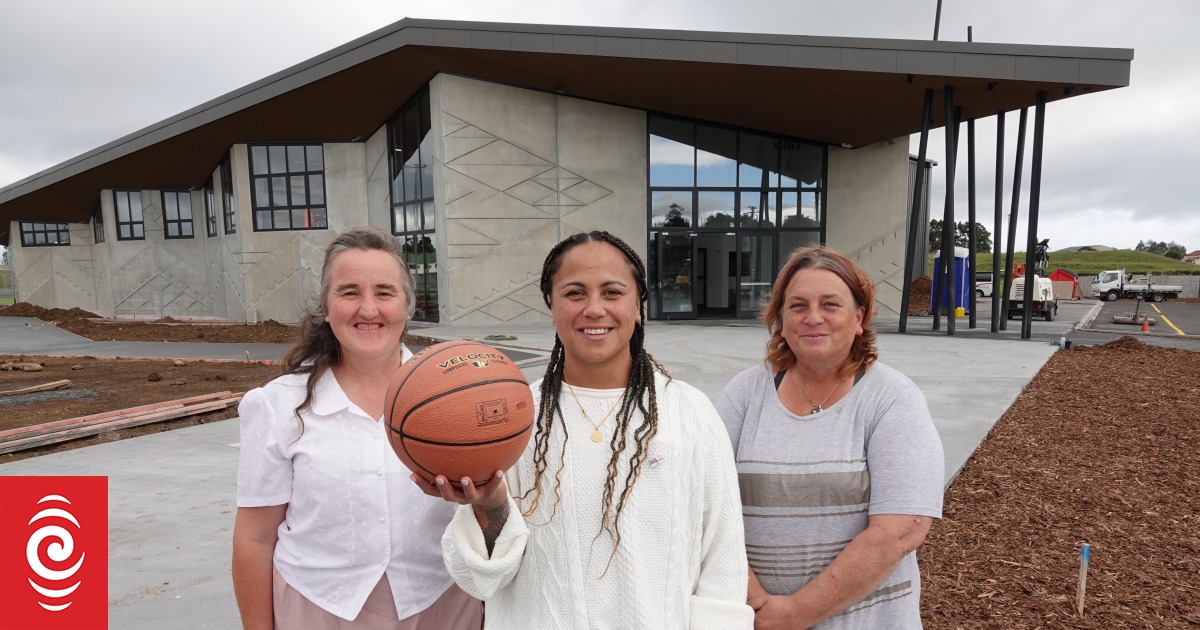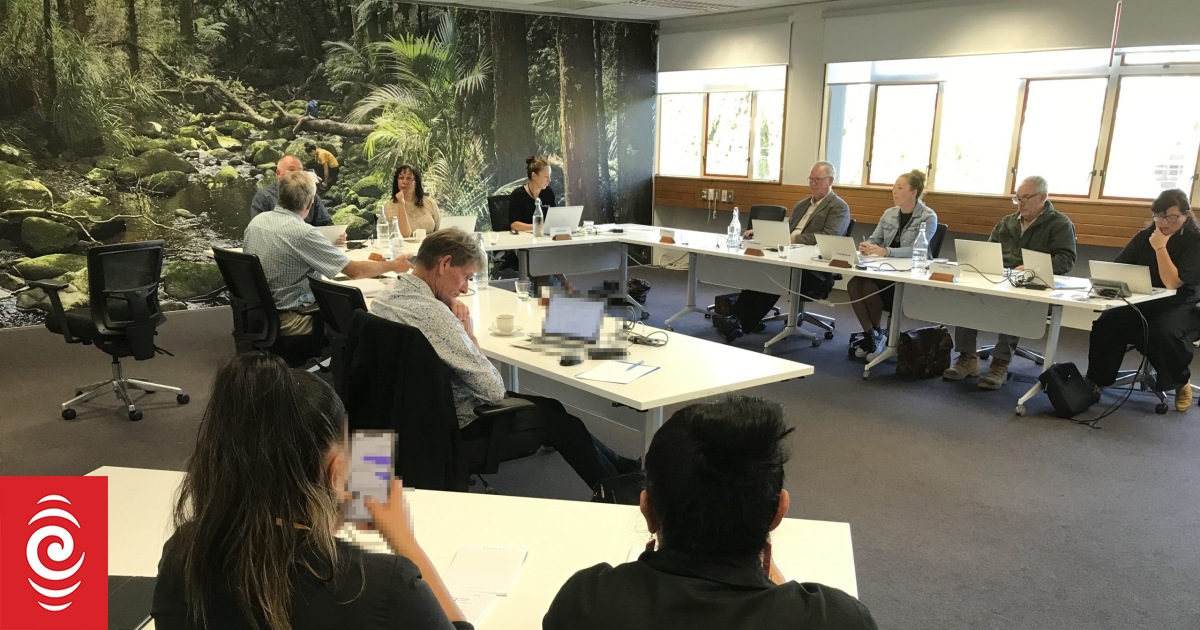Bishop Te Kitohi Pikaahu reads the names of the British dead to UK defence adviser Colonel Stewart Dines and British High Commissioner Iona Thomas during a ceremony at St Michael’s Church, on the site of the 1845 Battle of Ōhaeawai. Photo / Peter de Graaf
Two extraordinary acts of compassion at opposite ends of the earth have been remembered in a ceremony at one of Northland’s most historic churches.
Thursday’s thanksgiving service at Mikaera Tapu/St Michael’s Church in Ōhaeawai was the first formal event of this year’s Waitangi Day commemorations and drew a large cast of New Zealand and British dignitaries.
The programme described the service as “commemorating the great act of empathy by Ngāti Rangi toward fallen British troops and the generosity of Charlotte Dorothea Weale (Mihiwera) to Ngāpuhi”.
St Michael’s was built on the site of Ōhaeawai Pā, where the penultimate battle of the Northern War took place in mid-1845.
Advertisement
The British commander, Colonel Henry Despard, ignored the advice of his Māori allies and ordered a frontal assault on the pā, resulting in major loss of life. The dead were buried hastily at the British camp about a kilometre to the east.
In 1872, after a church was built on the battle site, Ngāti Rangi chief Heta Te Haara sought permission to re-inter the soldiers’ remains in the church grounds so they could have a proper Christian burial. The hapū also built a monument to the British dead.
The church itself was the result of another act of compassion.
In 1863, a group of 14 Māori brought to Britain by a missionary became stranded with no way of returning home.
Advertisement
Philanthropist Dorothea Weale, known to Māori as Mihiwera, heard of their plight and set about raising money to pay for their journey home.
Once back in Aotearoa, the group asked Weale how they could repay her. She asked them to build a church — so they built two, one at Mangakahia and the other on the battle site in Ōhaeawai.
The Mangakahia church burnt down in the 1920s, but St Michael’s still stands, and was fully restored last year thanks to a Provincial Growth Fund grant.
/cloudfront-ap-southeast-2.images.arcpublishing.com/nzme/7M6JKH56FVFFFBEX2OX3PTXMFU.jpg)
To remember those extraordinary events, Ngāti Rangi made three presentations during Thursday’s service.
British High Commissioner Iona Thomas was gifted a korowai [cloak] woven from muka [fine flax fibre] as a sign of gratitude to Mihiwera.
Thomas, who addressed the congregation in te reo Māori, accepted the cloak on behalf of Weale’s descendants and promised to try to pass on the gift.
A carved taiaha was presented to newly minted Defence Minister Andrew Little as a gesture of thanks to the New Zealand Defence Force for its ongoing commitment to St Michael’s, which included building the road to the church.
/cloudfront-ap-southeast-2.images.arcpublishing.com/nzme/N7XHXWBZFJAG7KANAXULLD4HNM.jpg)
Finally, a carved musket was presented to Colonel Stewart Dines, UK defence adviser to New Zealand, who accepted it on behalf of the regiments involved in the fateful battle.
An explanation of each gift was read by young descendants, with Huia Clarke saying Ngāti Rangi had given the dead a full Christian burial to “honour the courage of the British who, in obedience to absurd orders, fought a hopeless battle and lost their lives so far from home”.
Puawai Woodman said the ceremony was not about honouring the British dead or celebrating a victory. Rather, it was about celebrating “the honourable actions of our tūpuna [ancestors]”.
Advertisement
/cloudfront-ap-southeast-2.images.arcpublishing.com/nzme/DHOPQRPXURBBRCWX32AL7YE3S4.jpg)
Thomas told the Advocate it was a privilege to be part of the “incredibly moving” ceremony.
“I’ve read the stories about Mihiwera and the history of the New Zealand Wars, but being here in the place where the battle was fought and seeing the church has really brought it home and made it feel much more real.”
In her speech, the High Commissioner used the word manaakitanga, care for others, to describe actions on both sides 150 years ago.
“It’s that sense of generosity, the spirit of taking care of people, which we saw both through the re-interment of British troops, but also Dorothea Weale supporting the Māori who were left in London and needed return passage,” she said.
“We have received the taonga on behalf of her descendants and we’re going to see if there’s a way we could connect with them so that we can pass it on.”
/cloudfront-ap-southeast-2.images.arcpublishing.com/nzme/OI5JH7XMLVB3FBVR73ECEUXYJI.jpg)
For Tai Tokerau MP Kelvin Davis, the ceremony was personal — he counts among his ancestors some of the Māori who were stranded in Britain.
Advertisement
“It was through Mihiwera’s act of empathy and compassion that they were able to get back here. It’s beautiful history, and I’m really pleased and proud our history is being taught in schools across the country. It’s these sorts of stories that make us who we are.”
Another of those stories centred around the first Māori born in the UK. His parents, Hare Pomare and Hariata Pikimaui, were part of the group stranded in England.
When the group visited Queen Victoria at her summer residence on the Isle of Wight, she noticed Pikimaui was pregnant and asked to be the child’s godmother — and that the child, if a boy, be named after her late husband, Prince Albert.
Albert Victor Pomare was born shortly afterwards in London.
Queen Victoria maintained an interest in her godson until his death at sea around the 1880s. A christening set she gave him is on display at the Museum of Waitangi.
Former prime minister Jacinda Ardern was to have attended Thursday’s service in Ōhaeawai but her place was taken by Little and Davis.
Advertisement
Also present were ministers Peeni Henare, Kiri Allan, James Shaw and Willow-Jean Prime.
The service was led by Bishop Te Kitohi Pikaahu, with special honour given to Pearl Erstich, the only surviving grandchild of chief Heta Te Haara.
/cloudfront-ap-southeast-2.images.arcpublishing.com/nzme/OEIROOVGNBEMNGC34EJHIULEME.jpg)
/cloudfront-ap-southeast-2.images.arcpublishing.com/nzme/IJATFCEFX5EDJAVJJKQ2QT3L5I.jpg)
/cloudfront-ap-southeast-2.images.arcpublishing.com/nzme/IIHPEREFXFEGLKVJY7AISFFIEU.jpg)




